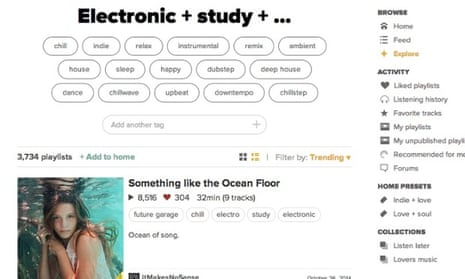It’s easy for the debate around digital music to be dominated by the big services, from iTunes and Spotify to YouTube and SoundCloud. With tens or hundreds of millions of users, that’s no surprise.
Actually, though, some of the most interesting digital music companies are operating at a smaller scale. Bandcamp, for example, has made independent artists $87m from direct sales to fans, and is now helping them launch subscriptions.
Zvooq is trying different forms of mobile music in Russia; MusicQubed is experimenting with £1 weekly subscriptions for downloadable playlists of popular music; and Mixcloud is finding a healthy audience for DJ mixes and radio-like shows.
US firm 8tracks is in a similar vein to the latter, and has become an under-the-radar success: not just popular, but profitable too. Some achievement given that most streaming music services are losing money by the sackful.
Eight million people listen to 30m hours a month of 8tracks’ “handcrafted music programming”, which takes the form of playlists uploaded by other users – or “DJs” as the company terms them. Thanks to its non-interactive radio licence, the company pays royalties on those tracks.
“We’ve pretty solidly stuck to our guns in terms of being a radio-style, leanback discovery-focused service,” David Porter, 8tracks’ founder and chief executive, tells the Guardian.
“We haven’t ventured down the on-demand licensing path, like so many seem to. Here in the States we compete against Pandora, but we’re nicely differentiated by taking the crowdsourced curation approach.”
8tracks launched in August 2008, bootstrapped by its founders, and ran for three years with “a little bit of cash from angel investors to pay our royalty bills” before raising a $1.2m seed round in 2011, then another $1.4m in 2014. The basic service is free with advertising, but also offers a “Plus” tier for subscribers to pay $25 every six months to remove the ads
“We are squarely in the college demographic. 50% of our audience is 18-24, and 75% is 18-34. We have a much more youthful audience than most, and we skew very indie – almost two thirds of our streaming comes from independent labels and artists,” says Porter.
“People tend to like the fact that the programming is more specific. If you’re into a very specific type of electronic music, that only people in Berlin and London know, we probably have it. And a lot of it!”
As 2014 nears its end, 8tracks is aiming to be a little bit more above the radar, with plans to do more (ie some) marketing to grow its audience further, and launching new features to make the site more accessible to those newcomers.
“We’re trying to get more people through our proverbial doorstep, but we also need to be better about how we matchmake between listener and DJ,” says Porter, who adds that around 1% of 8tracks’ users are uploading mixes regularly.

Among the new features are smarter use of the tags that 8tracks DJs have always used for their mixes to show genres, moods and other attributes, with the service now learning each user’s taste and suggesting relevant tags to help them find new playlists to listen to.
“We’ve just hired a data scientist, so we’re getting a little bit more clever about these things,” says Porter. “It helps us be better on the push front, and not be so reliant on the pull front. The idea is people have to do less digging, because they are having more refined suggestions pushed to them.”
8tracks has also launched new features for those DJs, including better analytics so they can see how their mixes are being listened to, as well as a notifications feed showing them likes and comments, to help them engage with their audience.
Alongside all this, 8tracks is also trying to improve its advertising business, with Porter telling the Guardian that in September, the company’s “revenue per thousand listener hours” (RPM – a metric also used by Pandora) reached $33.
Based on the 30m monthly listening hours stat, that suggests 8tracks is making just under $1m a month from advertising. Small in the music industry scheme of things, but according to Porter, growing steadily.
Update: bad maths! 8tracks has clarified that the $33 RPM figure related to the US only, whereas the listening hours stat is global. So not just under $1m a month.
“We’re still profitable!” he says. “Historically we operated in the States as a small pureplay webcaster, where we paid our royalties as a small percentage of revenue. Although now we’ve graduated to the large webcaster ranks, so we pay for a lot of our streaming on the same basis as Pandora.”
Not all, mind. Some tracks are streamed from SoundCloud, via an integration with that service that means for those songs “the artist or label has waived their royalties”. However, Porter says 8tracks thinks a lot about how it can be “a better friend” to independent labels in particular.
“We’re working towards direct deals with labels, certainly on the indie side of things where there’s more flexibility than with the majors,” he says.
“Some indie artists discover their traffic has blown up on SoundCloud, then find 75% of the new plays came from 8tracks. So their label will often send us a note: ‘this artist is resonating with your audience, so how can we work more closely with you?’.”
While Pandora has become something of a villain for many artists and songwriters in the US, 8tracks is hoping to avoid that fate. “We really do think hard about how to be a real friend to the artists and indie labels.”
The future of music sales is here: how CAN artists make it pay?
This article was amended on 19 November to clarify 8tracks’ advertising revenues.

Comments (…)
Sign in or create your Guardian account to join the discussion